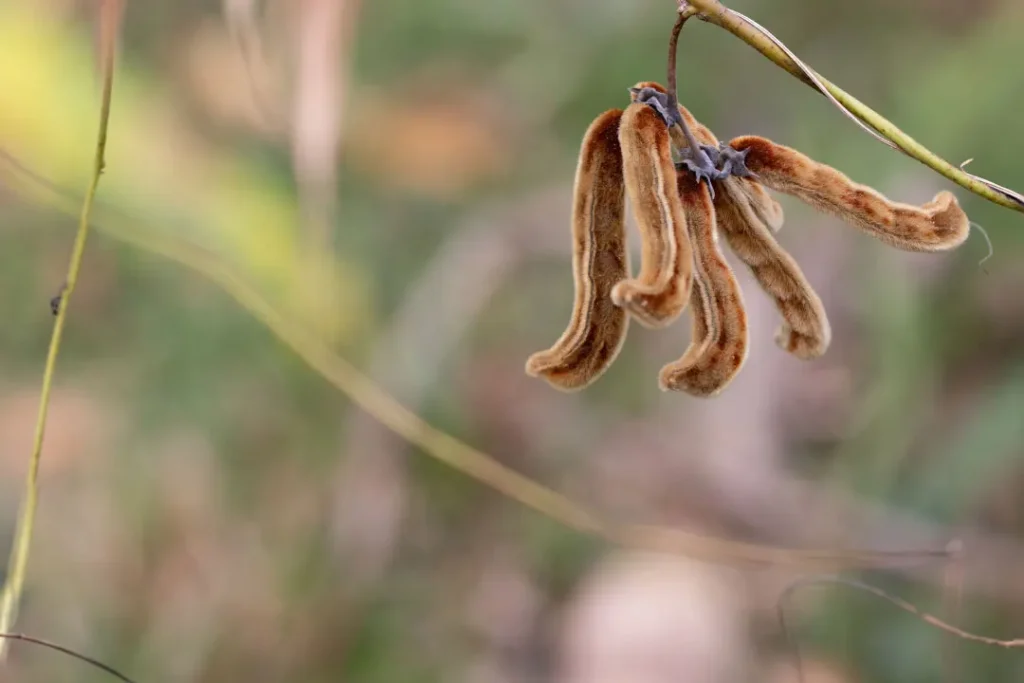Cowhage, also known as velvet bean, kapikacchu, or mucuna pruriens, has a long history in traditional medicine. This plant is native to tropical areas and is a mainstay of Ayurvedic medicine, and has been used for ages to treat many medical ailments. The nature of cowhage will be covered in detail in this article, along with its health advantages, dose recommendations, potential side effects, and drug interactions. We will also explain the chemistry of cowhage and the physiological processes that underlie how it affects the body and brain.
You May Also Like:
Caralluma: Benefits, Dosage, Side Effects, Drug Interactions, and Other Important Information
Capers: Benefits, Dosage, Side Effects, Drug Interactions, and Other Important Information
The Nature of Cowhage
Cowhage is a leguminous plant that is endemic to tropical and subtropical areas. It is distinguished by its hairy pods, which can make us extremely itchy when touched. The seeds of cowhage are the source of the plant’s nutritional value since they contain numerous bioactive substances. Furthermore, these seeds include additional phytochemicals such as alkaloids, saponins, and flavonoids. These seeds are a natural source of L-DOPA (levodopa), a precursor to dopamine.
Health Benefits of Cowhage
Cowhage has several health advantages, which reflect its bioactive components.
Psychological Advantages
Cowhage can help manage Parkinson’s disease, which is its most prominent health advantage. L-DOPA, which is present in its seeds, penetrates the blood-brain barrier, changing it into
dopamine in the brain[2]. This ability has also led to its usage as a natural levodopa substitute in treating Parkinson’s disease.
Libido and Fertility
Cowhage has a long history of usage in traditional medicine as a fertility booster and aphrodisiac. Recent scientific studies have supported these assertions, showing that cowhage supplementation can enhance sperm quality and libido due to its high alkaloid and saponin content[3].
Chemistry of Cowhage
Cowhage’s unique chemical composition is principally responsible for its abilities as a nutritional supplement. L-DOPA, an essential component in dopamine[1], is present in high concentrations in the seeds. The plant’s potential medicinal properties in treating Parkinson’s disease and other neurological illnesses are based on its L-DOPA content[2]. Additionally, alkaloids, saponins, and flavonoids found in cowhage add to its overall health advantages[1].

Physiological Properties of Cowhage
Cowhage’s high L-DOPA concentration is the physiological property through which it exerts its therapeutic benefits. Dopamine, a neurotransmitter involved in several brain activities, including motor regulation, is produced in the body from L-DOPA. Cowhage’s ability to treat Parkinson’s disease, which marks a decrease in dopamine-producing neurons[7], is supported by this property.
Cowhage contains alkaloids and saponins accounting for its positive effects on reproductive health. According to research, these substances can increase testosterone production and promote general sexual health[8].
Optimal Dosage
The ideal dosage of cowhage differs from person to person. It depends on your age, overall health, and the ailment you want to treat. Generally, a daily dose of 200–500 mg of a standardized extract containing 15% L–DOPA is frequently advised[4] for most people.
Side Effects
While excessive usage can still have side effects, cowhage is often well tolerated. These side effects can include gastrointestinal problems such as bloating, diarrhea, and nausea as well as less frequent neurological side effects like disorientation and hallucinations, especially when used in large doses[5].

Potential Substance Interactions
Cowhage, like many other natural supplements, can interact with specific drugs and chemicals. A noteworthy interaction between cowhage’s L-DOPA content and monoamine oxidase inhibitors (MAOIs), a kind of antidepressants, which can result in hypertensive crisis[6]. Additionally, using cowhage together with other drugs that increase dopamine can lead to high amounts of the neurotransmitter, which can cause symptoms including restlessness, agitation, and sleeplessness.
Responsible Use Practices
Before beginning cowhage supplementation, we encourage you to seek the advice of your healthcare practitioner due to the possible interactions and side effects. In addition, purchasing cowhage from reliable, trustworthy suppliers is essential to guarantee product purity and prevent adulteration.
Using cowhage as a dietary supplement responsibly should involve a few key factors. It is crucial to speak with your healthcare professional before starting a supplement program with cowhage. Given the likelihood of interactions and potential side effects, this is especially crucial if you have current medical issues or are taking other drugs.
While there is no one-size-fits-all recommendation for a typical cowhage dose, most people normally safely ingest 200–500 mg daily of a standardized extract that contains 15% L-DOPA[4]. Given the variances in the concentration of active substances across different product brands, it is imperative to follow the manufacturer’s recommendations or your healthcare provider’s advice.
Keep in mind that natural supplements should work in conjunction with conventional medication and a healthy diet, and not as a substitute for them. Furthermore, buying supplements from a reputable supplier assures the product’s performance, purity, and safety.
Although cowhage’s side effects are often minor, it is crucial to keep track of how your body is responding to the supplement. Any negative effects or alterations in your general health should be reported to your healthcare professional.

Cowhage: Conclusion
In conclusion, cowhage offers a promising dietary supplement with many health advantages. However, further investigation is required to clarify the complexities behind its therapeutic qualities and to create thorough recommendations for its safe use. Cowhage is a fascinating all-natural supplement that can greatly benefit your life and health. However, like with any dietary supplement, it should be used sensibly, under your doctor’s supervision, and from a reliable source. As your doctor if this supplement could be right for you, especially if you want to enhance your reproductive health!
References:
- “Extraction of bioactive principles from Mucuna pruriens seeds.” Retrieved from: https://www.ncbi.nlm.nih.gov/pubmed/15182907
- “Mucuna pruriens in Parkinson’s disease: a double-blind, randomized, controlled, crossover study.” Retrieved from: https://jnnp.bmj.com/content/75/12/1672.long
- “Effects of cannabidiol in the treatment of patients with Parkinson’s disease: an exploratory double-blind trial.” Retrieved from: https://journals.sagepub.com/doi/10.1177/0269881114550355
Important Note: The information contained in this article is for general informational purposes only, and should not be construed as health or medical advice, nor is it intended to diagnose, prevent, treat, or cure any disease or health condition. Before embarking on any diet, fitness regimen, or program of nutritional supplementation, it is advisable to consult your healthcare professional in order to determine its safety and probable efficacy in terms of your individual state of health.
Regarding Nutritional Supplements Or Other Non-Prescription Health Products: If any nutritional supplements or other non-prescription health products are mentioned in the foregoing article, any claims or statements made about them have not been evaluated by the U.S. Food and Drug Administration, and such nutritional supplements or other health products are not intended to diagnose, treat, cure, or prevent any disease.


